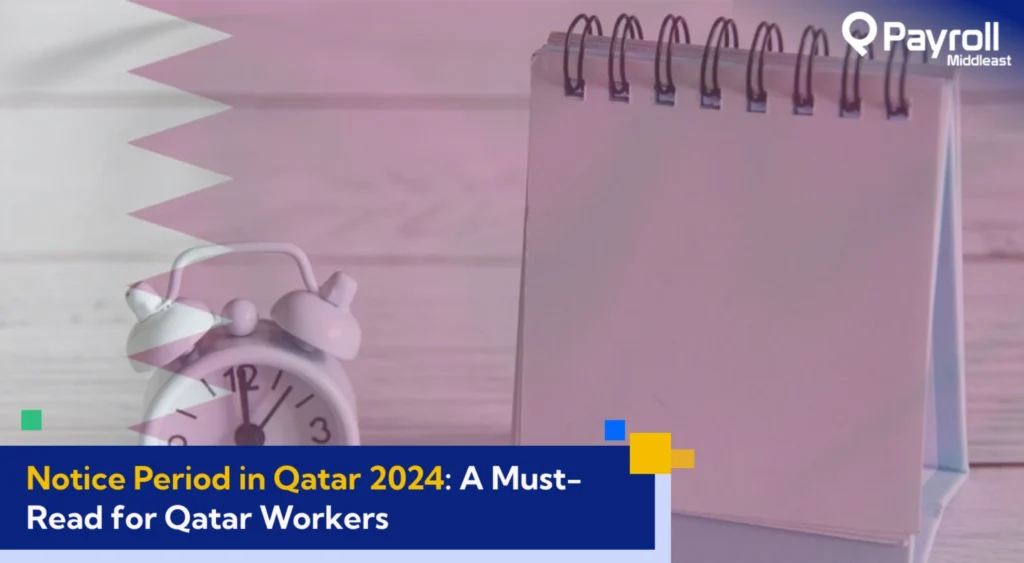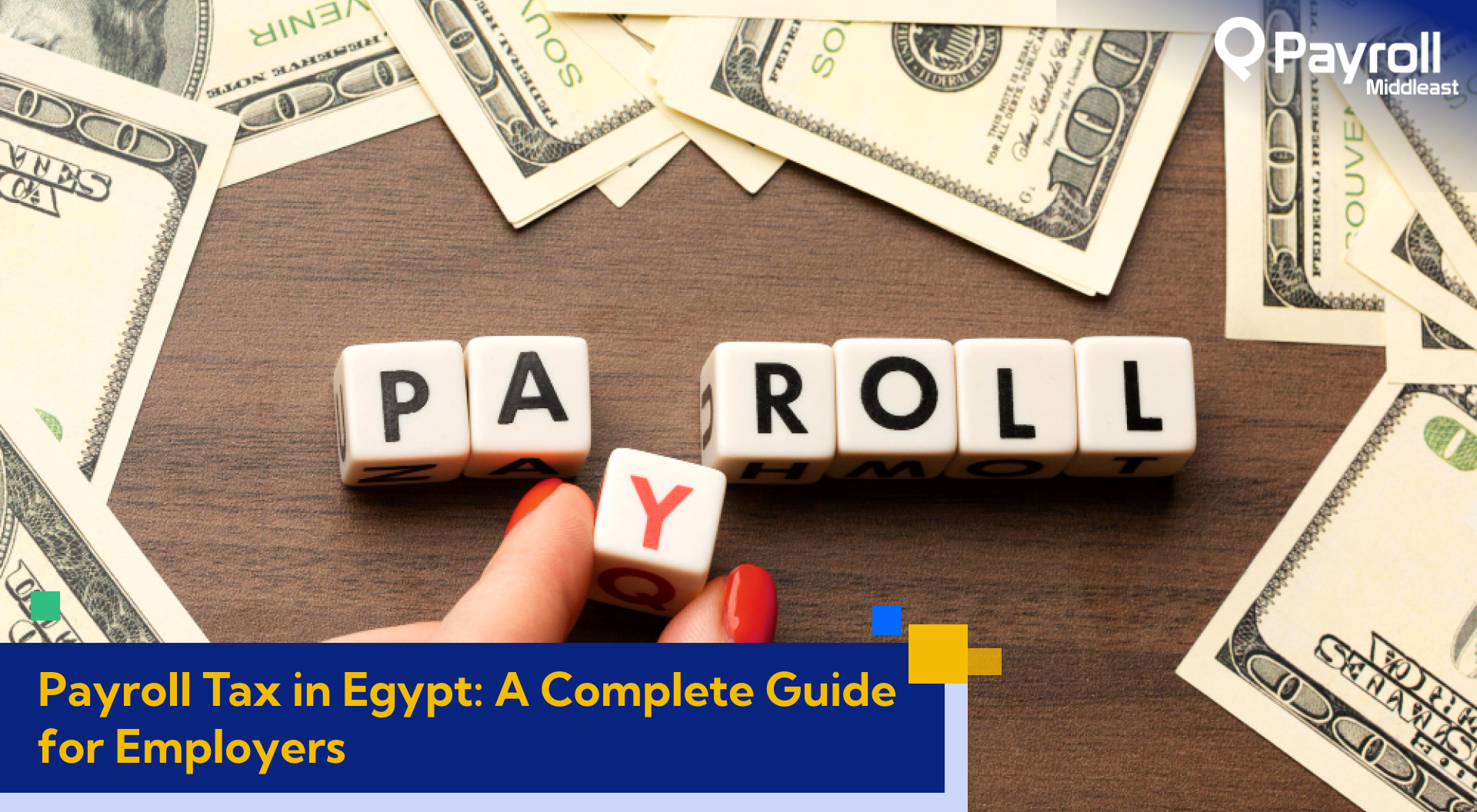Qatar’s workforce is changing rapidly with the passing years. The entrance of expatriates increases the desire to understand Qatar labour laws closely. The labour law related to termination, resignation, and notice period in Qatar all have their major importance.
If you’re considering resigning and want to know about the notice period. It is important to understand the ins and outs of the notice period. It is a timeframe that you give your employer/employee when you decide to leave a job. However, knowing the current regulations can help you make a smooth transition. You can change jobs, and protect your rights. Also, you can maintain a professional reputation.
This guide walks you through all the essential information you need about the notice period in Qatar, empowering you to make informed choices in your career!
What is the notice period in Qatar?
The notice period is the time frame an employee or employer must give before terminating a contract. The standard notice period is one month for most employment contracts. This is according to the notice period in Qatar labour law.
Although this can vary on the terms outlined in the contract itself. However, both parties need to obey this notice period. This helps to avoid penalties and ensure a smooth transition. Understanding your contract and any relevant laws can help you navigate this process effectively.
Legal Framework Governing Qatar Notice Period
Qatar’s notice period is governed mainly by the Labor Law of Qatar, which spells out the rights and obligations of employers and employees concerning terminating employment contracts. Article 49 of the statute, however, declares that the notice period for an employee or employer should be one month unless otherwise agreed in a particular employment contract.
In this case, there would be a relative probability between employers and employees. It helps prevent disputes and confirms a fair process during job transitions. Familiarity with these regulations is crucial for anyone working in Qatar. This aids in safeguarding their rights and navigates their employment effectively.
Statutory Notice Periods
Most employment contracts under Labor Law are subjected to a minimum notice period of one month. It therefore protects the parties. Ensuring that employees have sufficient time to prepare for their departure. It also allows employers to make necessary arrangements for a smooth transition. Following these statutory requirements is crucial. This helps avoid potential penalties or legal complications.
Contractual Notice Periods
Contractual notice periods refer to the specific duration outlined in an employment contract. The duration may differ from the statutory minimum. Employers and employees have the flexibility to negotiate these terms. They can be longer or shorter than the statutory one month. It depends on the agreement made.
However, it should be crystal clear to both parties at the time of hiring. It governs the process of resignation or termination. Even though it ensures sure fulfillment of any specific contractual obligations.
See More: What is Gratuity in Qatar and How to calculate
Difference between employee-initiated and employer-initiated terminations
Employee-Initiated Terminations:
Employee-initiated termination occurs when an employee voluntarily decides to leave their job through resignation. Reasons may include:
- Career advancement
- Personal circumstances
- Dissatisfaction with the current role
Employees are required to provide notice according to their employment contract or local labor laws. This ensures a smooth transition for both parties.
Employer-Initiated Terminations:
Employer-initiated terminations happen when an employer decides to terminate an employee’s contract. The reasons behind this are:
- Performance issues
- Organizational changes
- Economic factors
Employers must adhere to legal requirements. This includes providing appropriate notice or severance pay. However, it depends on the employment contract terms and local regulations. This can lead to more complex legal considerations and potential disputes if not handled properly.
Regulations and Obligations During Notice Period in Qatar
During the notice period, employers and employees have specific obligations. Qatar Labor Law must follow these regulations and clearly state them. Employees should continue performing their duties and remaining professional. The employer ensures that the entire salary and compensation are paid within the time frame of this relief.
Termination during notice cannot be done by the employers unless when there is serious misconduct. Open communication between both parties would be required to ensure a smooth transition. For failing to comply with these regulations, either of them can engage in legal disputes with the other.
Understanding these obligations is crucial. Particularly for maintaining a positive working relationship during the notice period.
Employee Obligations
During the notice period, employees can continue working and fulfill their job responsibilities. Additionally, they must provide formal written notification of their resignation. However, it adheres to the terms outlined in their employment contract.
Continue Work
Employees are required to fulfill their job responsibilities and maintain them during the notice period. They are open to attending work regularly, completing tasks, and collaborating with colleagues. This ensures a professional transition.
Notification
Usually, the period of notice that applies to leaving work is indicated in the employment contract, where an employee needs to formally communicate his or her resignation to the employer. Notice needs to be given within the specified notice period. This holds especially true in light of local labor laws and also allows for an orderly transfer of work. Communication needs to be clear at this point so things do not go sour.
Employer Obligations
Employers must fulfill the following obligations regarding his/her employees. This involves the following details:
Notice Period Length
Employers are required to honor the agreed-upon notice period. It ensures that employees are informed in advance of any changes to their employment status.
Salary & Benefits
During the notice period, employers must continue to pay the employee their full salary and benefits. The same is stipulated in the employment contract and by local labor laws.
Early Termination Compensation
If an employer decides to terminate an employee before the end of the notice period without cause. In this case, they may be obligated to provide compensation. It could include severance pay or other benefits.
Repatriation Costs
Employers are responsible for covering repatriation costs. Particularly for expatriate employees. This includes travel expenses back to their home country if stipulated in the employment contract.
Restrictions on Dismissal
Employers are prohibited from dismissing employees during the notice period. Unless there are grounds for serious misconduct. This ensures that the process is fair and lawful.
Process for submitting a notice through the MoL system
Explore the process for submitting a notice through the MoL system makes your process seamless. For instance, it contains the following steps:
Access the MoL Portal
Begin by visiting the Ministry of Labor’s official website (https://www.mol.gov.qa/) or mobile application to access the e-services section.
Login/Register
If you already have an account, log in using your credentials. If not, you’ll need to create a new account. Provide your details and relevant identification.
Select the Notice Submission Service
Navigate to the appropriate section for submitting a notice of resignation or termination. Look for options related to employment services or contract management.
Fill Out the Required Form
Complete the online form with the necessary details. This includes:
- Your personal information
- Employer’s name
- Position, and the reason for your notice
Ensure all fields are accurately filled.
Upload Supporting Documents
Upload any supporting documents, such as:
- Your resignation letter or
- Employment contract, as specified by the system.
Review and Submit
Carefully review all the information you’ve entered to ensure accuracy. Submit the notice through the MoL system once verified.
Confirmation
You should receive a confirmation notification via email or within the MoL portal after submission. Keep this confirmation for your records.
Follow Up
It’s advisable to follow up with your employer to discuss the next steps. This ensures a smooth transition during your notice period.
Requirements:
Here, we share the requirements for submitting a notice through the MoL System. This entails:
- Qatari ID QID
- Phone Number
- Completed Employer Form
Qatari ID (QID)
You must have a valid Qatari ID. It serves as proof of your identity and residency in Qatar.
Phone Number
Provide a valid phone number for communication purposes. The phone number may be used for notifications or further correspondence regarding your notice.
Completed Employer Form
Ensure you have a completed employer form that outlines your intention to resign or terminate your contract. This includes necessary details such as your:
- Notice Period.
- Reason for leaving.
This form may need to be signed by your employer or HR department.
Steps
The steps to submit a notice through the MoL system have been discussed in detail:
Access the MoL Electronic System
Begin by visiting the Ministry of Labor (MoL) official website. You can also download their mobile application. Now, navigate to the e-services section to access the notice submission platform.
Submit the Notice
Log in to your account using your Qatari ID and password. Select the option to submit a resignation notice period in Qatar or termination. Firstly, fill out the required fields, then upload any necessary documents, and lastly review your information for accuracy. Submit your notice through the system, once everything is complete. Upon successful submission, you should receive a confirmation notification.
Conclusion
Understanding Qatar’s notice period is crucial for both employees and employers. However, it is essential to be aware of the legal requirements, obligations, and potential consequences. That is associated with notice periods. It can empower workers to make informed decisions about their careers.
So, if you’re considering a job change or managing your workforce, clarity on this topic helps ensure smoother transitions. Similarly, it also protects your rights. Confidently navigate your employment journey in Qatar by familiarizing yourself with the latest regulations and best practices.
FAQs:
What is the standard notice period in Qatar as per the Labour Law 2025?
In 2025, the standard notice period remains one month for employees with less than five years of service and two months for those with more.
Is the notice period the same for employers and employees in Qatar?
Yes, both parties must provide notice as per the employment contract and Labour Law requirements.
How long is the notice period for employees on probation in Qatar?
During probation, either party can terminate the contract with at least one week’s notice.
Can employees resign without serving a notice period in Qatar?
Only in cases of employer misconduct or violation of labor rights, as defined under Qatari law.
Are employees entitled to salary and benefits during the notice period in Qatar?
Yes. Employees must continue to receive full salary and benefits until the last working day of the notice period.





